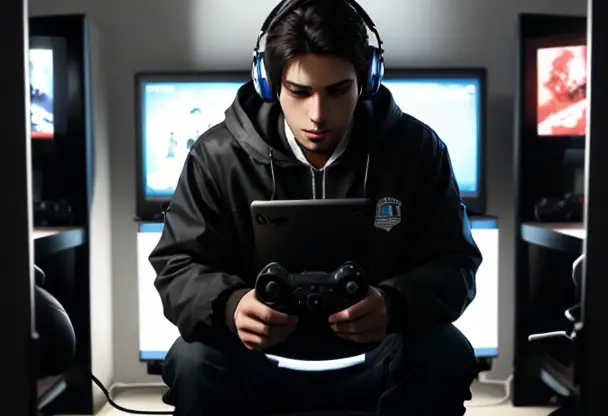In an era dominated by technology, gaming has become a widely embraced form of entertainment. However, for some individuals, the line between a hobby and an addiction becomes blurred, leading to significant consequences for their personal, social, and academic lives. Understanding the signs of gaming addiction and knowing how to help individuals struggling with this issue is crucial for fostering a healthy relationship with technology. This guide explores effective ways to assist a gaming addict on their path to recovery.
Recognizing Signs of Gaming Addiction
Before delving into the ways to help a gaming addict, it’s essential to recognize the signs of addiction. Identifying these signs early can facilitate timely intervention and support. Behavioral changes such as neglecting responsibilities, declining academic or work performance, and withdrawal from social interactions may indicate a gaming addiction. Recognizing the signs in oneself or others is the first step toward addressing the issue.
The Impact of Gaming Addiction
Understanding the profound impact of gaming addiction is crucial for motivating individuals to seek help. Addiction can strain personal relationships, leading to misunderstandings and conflicts with family and friends. Academic and professional repercussions, including missed deadlines and poor performance, are common consequences. Moreover, gaming addiction can have significant implications for mental and physical health, contributing to stress, anxiety, and sedentary lifestyle-related health issues.
Approaching and Communicating with the Individual
Approaching a gaming addict requires sensitivity and empathy. Choosing the right time and setting is crucial, ensuring a calm and non-confrontational environment. When expressing concern, it’s essential to use non-judgmental language and focus on the impact rather than placing blame. Offering support and emphasizing the willingness to help creates a foundation for open communication.
Seeking Professional Help
Gaming addiction, like other forms of addiction, often requires professional intervention. Mental health professionals, including psychologists and counselors, specialize in addressing addictive behaviors. Counseling and therapy sessions provide a structured and supportive environment for individuals to explore the underlying causes of addiction and develop coping mechanisms. Additionally, support groups specifically designed for gaming addiction offer a sense of community and shared experiences.
Implementing Lifestyle Changes
Encouraging lifestyle changes is integral to the recovery process. A balanced routine that includes sufficient time for work, social interactions, and leisure activities beyond gaming is essential. Setting realistic goals and priorities helps individuals regain control over their lives. Introducing alternative activities, such as physical exercise, creative pursuits, or educational endeavors, can replace excessive gaming and contribute to overall well-being.
Support from Family and Friends
Family and friends play a crucial role in the recovery journey of a gaming addict. Creating a supportive environment involves expressing empathy, understanding, and patience. Involving loved ones in the recovery process fosters a sense of accountability and encourages positive behaviors. Setting healthy boundaries, such as limiting screen time or designating specific gaming periods, helps create a structured and supportive framework.
Utilizing Technology and Parental Controls
In the digital age, technology can also be part of the solution. Monitoring and controlling gaming time through the use of parental control software can assist in establishing healthy habits. Setting up limitations on certain games or platforms helps individuals regain control over their gaming habits. Promoting responsible technology use ensures that gaming remains a source of entertainment rather than a destructive force.
Building a Support System
The recovery journey is often more manageable with a strong support system in place. Involving friends in the process can provide additional motivation and understanding. Joining online or local support groups for gaming addiction connects individuals with others facing similar challenges. The emotional support and shared experiences within these groups contribute to a sense of community and understanding.
FAQs
- Can someone recover from gaming addiction on their own?
- While some individuals may make progress independently, seeking professional help and building a support system significantly enhances recovery chances.
- Is gaming addiction similar to other forms of addiction?
- Yes, gaming addiction shares similarities with other addictive behaviors, involving compulsive use despite negative consequences.
- How long does recovery from gaming addiction take?
- Recovery timelines vary, depending on the individual’s commitment, the severity of addiction, and the support received. It’s a gradual process that requires patience.
- Can gaming addiction relapse occur after recovery?
- Yes, relapses can happen, emphasizing the need for ongoing support and coping mechanisms to maintain a healthy relationship with gaming.
- Are there age-specific considerations in addressing gaming addiction?
- Yes, addressing gaming addiction in children may involve additional considerations and age-appropriate interventions.
Conclusion
Assisting a gaming addict requires a multifaceted approach that combines understanding, empathy, and practical strategies. Recognizing the signs of addiction, communicating effectively, and involving professionals when necessary are vital steps in the recovery process. Implementing lifestyle changes, garnering support from family and friends, and utilizing technology responsibly contribute to a holistic approach to overcoming gaming addiction.
In conclusion, individuals struggling with gaming addiction should know that help is available, and recovery is possible with the right support. By fostering a supportive environment and encouraging positive changes, friends, family, and professionals can play pivotal roles in helping a gaming addict reclaim control over their life. The journey to recovery may have its challenges, but with perseverance and a comprehensive support system, individuals can emerge stronger and healthier.
Also Read Latest Posts
How Gaming Affects Learning in College
How to Deal with Child Gaming Addiction
Why Understanding the Psychology of Mobile Gaming Can Help You Manage Playtime Effectively?

